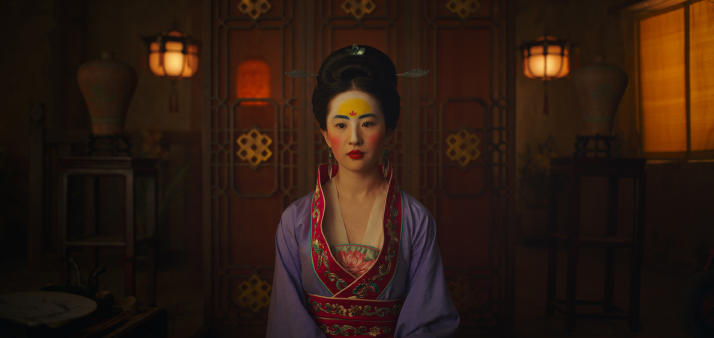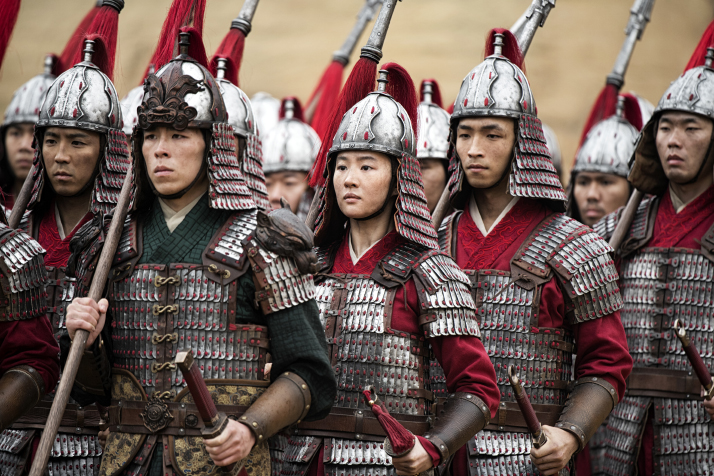| Lifestyle |
| Initial box office remains tepid while critics say woman warrior remains a role model | |
|
|
 A poster of Mulan, the Disney film directed by New Zealander Niki Caro with Chinese actress Liu Yifei as the warrior heroine (FILE)
Song of Mulan, the ballad written 1,500 years ago by an anonymous Chinese poet, has inspired countless plays, novels and poems over the centuries. It is part of many school textbooks that children in China have grown up learning. In 1998, Disney made an animation film Mulan on the young woman who disguised herself as a warrior and joined the king's army in her aged father's place to fight invaders and safeguard the nation. The story also attracted Niki Caro, the New Zealand director known for her Oscar-nominated 2002 film Whale Rider, an engrossing drama about a Maori girl who becomes the chief of a tribe where according to the Maori tradition, only men were accepted as chiefs. Caro became keen to make a film on Mulan. "What drew me to this project was Mulan herself, her journey from village girl to soldier to warrior to hero," she told Xinhua News Agency. But the new Mulan met with more adversities than its heroine had. One of the most anticipated movies of the year and originally due for release in March, the release date had to be postponed twice due to the novel coronavirus pandemic. However, it was finally released in Chinese theaters on September 11. Jiang Fan, a 28-year-old mother in Nanjing, Jiangsu Province in east China, was among those who queued up to see the film at the first screening. Mulan has been Jiang's favorite "Disney princess" since she watched the animation. "I was moved by her power and tenacity, which made her a fierce fighter from an ordinary girl," Jiang told Beijing Review. The theater she walked into had large posters of the film everywhere, showing Mulan in her red battle dress, holding a sword. This time, she reviewed the story with her 4-year-old daughter. "I wanted to introduce my old friend to my daughter and explain to her what love for the family and country is, and how to be strong in adversity," Jiang said.  A screen shot from Mulan (FILE)
Miscalculating the China factor The action drama based on the animation took Caro and her team five years and cost Disney over $200 million. However, due to the pandemic, Disney changed the plan to release it in theaters around the world and opted for streaming it with a limited theater release in China. Thanks to effective epidemic prevention and control, cinemas in China, the second largest film market in the world, have resumed for nearly a month, which is a positive signal for the film industry worldwide. "If Mulan doesn't work in China, we have a problem," Alan F. Horn, Co-Chairman of the Walt Disney Studios, told The Hollywood Reporter. However, in the first four days since its release in China, Mulan brought in just $23.2 million, below the $30 million the Christopher Nolan-directed sci fi-meets-spy film Tenet generated the previous weekend. That puts it on the low end of Disney film debuts in China. Besides the restrictive reopening policies for cinemas in China, unsatisfied viewers also contributed to the cold reception. Though Caro integrated many Chinese elements into the film, Chinese viewers did not buy them. Some of these elements, which make the film a stereotype of Oriental elements in the eyes of the Western world, failed to depict Chinese history and culture accurately to the Chinese. For instance, the place in east China that has been shot as Mulan's hometown is actually about 3,000 km away from her historical home. On Chinese film review website Douban, it has nearly 170,000 reviews, most of which are tepid, giving the film a maximum 4.9 out of 10 stars. However, Mulan got 7.5 on Rotten Tomatoes, the film review site in the U.S.  A still from Mulan (FILE)
The Chinese perspective In the eyes of industry insiders, this reflects the cultural differences among countries. Li Jiaxin, a Chinese film producer, told Beijing Business Today, "The Chinese prefer to see a heroine who takes her father's place in the army. How Mulan transforms from a traditional woman's character reflects women's struggles in ancient times as well as Mulan's filial piety and bravery." However, in Caro's film, she is more of a Disney princess stereotype, with a witch as her foil. As a result, the Chinese audience may not buy it, she added. Zhang Wei, a film critic, told Beijing Review that it is challenging for even a Chinese team to dramatize such a well-known story with profound Chinese culture and meet people's expectations, let alone for a U.S. company. However, the film leads people to think about the double standard in society. It accepts male dominance while women are judged when they try to challenge the rules. "Told not to forget her place all the time, Mulan finally finds her place. She questions the rules, defies them and demonstrates women's empowerment. "In my opinion, Mulan will tell girls all over the world to be brave," Zhang said. Common element Though it was a letdown for Jiang that the film had dropped Mushu, a small dragon that was the guardian angel of Mulan's family in the original animation, she still liked it. "The film is faithful to the original plot and captures the theme of loyalty to the family and the country, interpreting Mulan's spirit correctly," she said. "It encourages women to follow their hearts and dare to speak up. That is a significant extension of the animation." Disney depicts Mulan as an independent woman who can save herself instead of waiting for someone to save her, Zhang Zhouxiang, a China Daily commentator, said. "That's a good point where Chinese and Western values are similar because gender equality and female independence are now valued in both cultures. It will strike a chord with both Chinese and Western audiences." Caro said for her, it has always been essential to have strong female characters at the center of a film. It is now more important than ever before, particularly female characters that are complex. "Not just strong, but complicated, vulnerable, smart, honest and loving," she said, adding that Mulan is all of those things. "It's not that we don't have great female directors. We do. It's that they are not given enough opportunities," Caro said. "But I hope Mulan will help change that. Now the spotlight is on us, and we need to hold it and keep having this conversation until we have a real impact." Before the China screening, the long-awaited film premiered on Disney+, Disney's streaming service, on September 4, with subscribers needing to pay $29.99 to view it. It is a significant experiment for Disney. Bob Chapek, Disney CEO, told the media, "We are looking at Mulan as a one-off, as opposed to trying to say that there is some new business window model we are looking at." Chapek said Mulan would be a "fairly large stimulus" for new consumers to sign up for the streaming service. "We see this as an opportunity to bring this incredible film to a broad audience currently unable to go to movie theaters, while also further enhancing the value and attractiveness of a Disney+ subscription," he said. Since Mulan was streamed on Disney+, it has brought in $33.5 million, nearly equivalent to current sales in cinemas. This indicates that the streaming platform can bring significant gains for Disney. (Printed Edition Title: Mixed Reaction To Mulan) Copyedited by Sudeshna Sarkar Comments to liqing@bjreview.com |
|
||||||||||||||||||||||||||||
|
